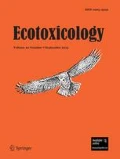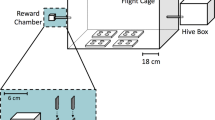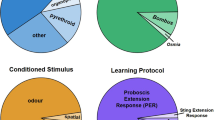Abstract
Bee pollination is economically and ecologically vital and recent declines in bee populations are therefore a concern. One possible cause of bee declines is pesticide use. Bumblebees exposed to imidacloprid, a neonicotinoid pesticide, have been shown to be less efficient foragers and collect less pollen on foraging trips than unexposed bees. We investigated whether bumblebees (Bombus impatiens) chronically exposed to imidacloprid at field-realistic levels of 2.6 and 10 ppb showed learning deficits that could affect foraging. Bumblebees were tested for their ability to associate flower colour with reward value in a simulated foraging environment. Bumblebees completed 10 foraging trips in which they collected sucrose solution from artificial flowers that varied in sucrose concentration. The reward quality of each artificial flower was predicted by corolla colour. Unexposed bumblebees acquired a preference for feeding on the most rewarding flower colour on the second foraging trip, while bumblebees exposed at 2.6 and 10 ppb did not until their third and fifth trip, respectively. The delay in preference acquisition in exposed bumblebees may be due to reduced flower sampling and shorter foraging trips. These results show that bumblebees exposed to imidacloprid are slow to learn the reward value of flowers and this may explain previously observed foraging inefficiencies associated with pesticide exposure.







Similar content being viewed by others
References
Aguilar R, Ashworth L, Galetto L, Aizen MA (2006) Plant reproductive susceptibility to habitat fragmentation: review and synthesis through a meta-analysis. Ecol Lett 9:968–980. https://doi.org/10.1111/j.1461-0248.2006.00927.x
Aliouane Y, El Hassani AK, Gary V, Armengaud C, Lambin M, Gauthier M (2009) Subchronic exposure of honeybees to sublethal doses of pesticides: effects on behavior. Environ Toxicol Chem 28:113–122. https://doi.org/10.1897/08-110.1
Ashman T, Knight TM, Steets JA, Amarasekare P, Burd M, Campbell DR, Dudash MR, Johnston MO, Mazer SJ, Mitchell RJ, Morgan MT, Wilson WG (2004) Pollen limitation of plant reproduction: ecological and evolutionary causes and consequences. Ecology 85:2408–2429. https://doi.org/10.1890/03-8024
Barbara GS, Grünewald B, Paute S, Gauthier M, Raymond-Delpech V (2008) Study of nicotinic acetylcholine receptors on cultured antennal lobe neurones from adult honeybee brains. Invert Neurosci 8:19–29. https://doi.org/10.1007/s10158-007-0062-2
Baron GL, Raine NE, Brown MJF (2017a) General and species-specific impacts of a neonicotinoid insecticide on the ovary development and feeding of wild bumblebee queens. Proc R Soc B 284:20170123. https://doi.org/10.1098/rspb.2017.0123
Baron GL, Jansen VAA, Brown MJF, Raine NE (2017b) Pesticide reduces bumblebee colony initiation and increases probability of populaion extinction. Nat Ecol Evol 1:1308–1316. https://doi.org/10.1038/s41559-017-0260-1
Blacquière T, Smagghe G, van Gestel CA, Mommaerts V (2012) Neonicotinoids in bees: a review on concentrations, side-effects and risk assessment. Ecotoxicology 21:973–992. https://doi.org/10.1007/s10646-012-0863-x
Colla SR, Packer L (2008) Evidence for decline in eastern North American bumblebees (Hymenoptera: Apidae), with special focus on Bombus affinis Cresson. Biodivers Conserv 17:1379–1391. https://doi.org/10.1007/s10531-008-9340-5
Cresswell JE (2011) A meta-analysis of experiments testing the effects of a neonicotinoid insecticide (imidacloprid) on honey bees. Ecotoxicology 20:149–157. https://doi.org/10.1007/s10646-010-0566-0
Decourtye A, Armengaud C, Renou M, Devillers J, Cluzeau S, Gauthier M, Pham-Delègue M-H (2004a) Imidacloprid impairs memory and brain metabolism in the honeybee (Apis mellifera L.). Pestic Biochem Phys 78:83–92. https://doi.org/10.1016/j.pestbp.2003.10.001
Decourtye A, Devillers J, Cluzeau S, Charreton M, Pham-Delègue M-H (2004b) Effects of imidacloprid and deltamethrin on associative learning in honeybees under semi-field and laboratory conditions. Ecotoxicol Environ Saf 57:410–419. https://doi.org/10.1016/j.ecoenv.2003.08.001
Doublet V, Labarussias M, Miranda JR, Moritz RFA, Paxton RJ, Sveriges I (2015) Bees under stress: sublethal doses of a neonicotinoid pesticide and pathogens interact to elevate honey bee mortality across the life cycle. Environ Microbiol 17:969–983. https://doi.org/10.1111/1462-2920.12426
Dyer AG, Chittka L (2004) Fine colour discrimination requires differential conditioning in bumblebees. Naturwissenschaften 91:224–227. https://doi.org/10.1007/s00114-004-0508-x
Ellis JD, Evans JD, Pettis J (2010) Colony losses, managed colony population decline, and colony collapse disorder in the United States. J Apic Res 49:134–136. https://doi.org/10.3896/IBRA.1.49.1.30
Evans LJ, Raine NE (2014) Foraging errors play a role in resource exploration by bumble bees (Bombus terrestris). J Comp Physiol A 200:475–484. https://doi.org/10.1007/s00359-014-0905-3
Fairbrother A, Purdy J, Anderson T, Fell R (2014) Risks of neonicotinoid insecticides to honeybees. Environ Toxicol Chem 33:719–731. https://doi.org/10.1002/etc.2527
Fauser-Misslin A, Sadd BM, Neumann P, Sandrock C, Osborne J (2014) Influence of combined pesticide and parasite exposure on bumblebee colony traits in the laboratory. J Appl Ecol 51:450–459. https://doi.org/10.1111/1365-2664.12188
Feltham H, Park K, Goulson D (2014) Field realistic doses of pesticide imidacloprid reduce bumblebee pollen foraging efficiency. Ecotoxicology 23:317–323. https://doi.org/10.1007/s10646-014-1189-7
Gallai N, Salles J-M, Settele J, Vaissière BE (2009) Economic valuation of the vulnerability of world agriculture confronted with pollinator decline. Ecol Econom 68:810–821. https://doi.org/10.1016/j.ecolecon.2008.06.014
Gbylik-Sikorska M, Sniegocki T, Posyniak A (2015) Determination of neonicotinoid insecticides and their metabolites in honey bee and honey by liquid chromatography tandem mass spectrometry. J Chromatogr B 900:132–140. https://doi.org/10.1016/j.jchromb.2015.03.016
Gill RJ, Raine NE (2014) Chronic impairment of bumblebee natural foraging behaviour induced by sublethal pesticide exposure. Funct Ecol 28:1459–1471. https://doi.org/10.1111/1365-2435.12292
Gill RJ, Ramos-Rodriguez O, Raine NE (2012) Combined pesticide exposure severely affects individual- and colony-level traits in bees. Nature 491:105–108. https://doi.org/10.1038/nature11585
Girolami V, Marzaro M, Vivan L, Mazzon L, Greatti M, Giorio C, Marton D, Tapparo A (2012) Fatal powdering of bees in flight with particulates of neonicotinoids seed coating and humidity implication. J Appl Entomol 136:17–26. https://doi.org/10.1111/j.1439-0418.2011.01648.x
Godfray HCJ, Blacquière T, Field LM, Hails RS, Potts SG, Raine NE, Vanbergen AJ, McLean AR (2015) A restatement of recent advances in the natural science evidence base concerning neonicotinoid insecticides and insect pollinators. Proc R Soc B 282:20151821. https://doi.org/10.1098/rspb.2015.1821
Goulson D (2013) Review: an overview of the environmental risks posed by neonicotinoid insecticides. J Appl Ecol 50:977–987. https://doi.org/10.1111/1365-2664.12111
Goulson D, Lye GC, Darvill B (2008) Decline and conservation of bumble bees. Annu Rev Entomol 53:191–208. https://doi.org/10.1146/annurev.ento.53.103106.093454
Han P, Niu C-Y, Lei C-L, Cui J-J, Desneux N (2010) Use of an innovative T-tube maze assay and the proboscis extension response assay to assess sublethal effects of GM products and pesticides on learning capacity of the honey bee Apis mellifera L. Ecotoxicology 19:1612–1619. https://doi.org/10.1007/s10646-010-0546-4
Henry M, Béguin M, Requier F, Rollin O, Odoux J-F, Aupinel P, Aptel J, Tchamitchian S, Decourtye A (2012) A common pesticide decreases foraging success and survival in honey bees. Science 336:348–350. https://doi.org/10.1126/science.1215039
Jeschke P, Nauen R, Schindler M, Elbert A (2011) Overview of the status and global strategy for neonicotinoids. J Agric Food Chem 59:2897–2908. https://doi.org/10.1021/jf101303g
Klein A-M, Vaissière BE, Cane JH, Steffan-Dewenter I, Cunningham SA, Kremen C, Tscharntke T (2007) Importance of pollinators in changing landscapes for world crops. Proc Biol Sci 274:303–313. https://doi.org/10.1098/rspb.2006.3721
Kremen C, Williams NM, Aizen MA, Gemmill-Herren B, LeBuhn G, Minckley R, Packer L, Potts SG, Roulston T, Steffan-Dewenter I, Vázquez DP, Winfree R, Adams L, Crone EE, Greenleaf SS, Keitt TH, Klein A-M, Regetz J, Ricketts TH (2007) Pollination and other ecosystem services produced by mobile organisms: a conceptual framework for the effects of land-use change. Ecol Lett 10:299–314. https://doi.org/10.1111/j.1461-0248.2007.01018.x
Laverty TM (1994) Bumble bee learning and flower morphology. Anim Behav 47:531–545. https://doi.org/10.1006/anbe.1994.1077
Laycock I, Lenthall KM, Barratt AT, Cresswell JE (2012) Effects of imidacloprid, a neonicotinoid pesticide, on reproduction in worker bumble bees (Bombus terrestris). Ecotoxicology 21:1937–1945. https://doi.org/10.1007/s10646-012-0927-y
Lundin O, Rundlöf M, Smith HG, Fries I, Bommarco R (2015) Neonicotinoid insecticides and their impacts on bees: a systematic review of research approaches and identification of knowledge gaps. PLoS ONE 10:eo136928. https://doi.org/10.1371/journal.pone.0136928
Matsuda K, Buckingham SD, Kleier D, Rauh JJ, Grauso M, Sattelle DB (2001) Neonicotinoids: insecticides acting on insect nicotinic acetylcholine receptors. Trends Pharmacol Sci 22:573–580. https://doi.org/10.1016/S0165-6147(00)01820-4
Matsumoto T (2013) Reduction in homing flights in the honey bee Apis mellifera after a sublethal dose of neonicotinoid insecticides. Bull Insect 66:1–9
Moffat C, Pacheco JG, Sharp S, Samson AJ, Bollan KA, Huang J, Buckland ST, Connolly CN (2015) Chronic exposure to neonicotinoids increases neuronal vulnerability to mitochondrial dysfunction in the bumblebee (Bombus terrestris). FASEB J 29:2112–2119. https://doi.org/10.1096/fj.14-267179
Müller CB, Schmid-Hempel P (1992) Correlates of reproductive success among field colonies of Bombus lucorum: the importance of growth and parasites. Ecol Entomol 17:343–353. https://doi.org/10.1111/j.1365-2311.1992.tb01068.x
Muth F, Papaj DR, Leonard AS (2015) Colour learning when foraging for nectar and pollen: bees learn two colours at once. Biol Lett 11:20150628. https://doi.org/10.1098/rsbl.2015.0628
Ollerton J, Winfree R, Tarrant S (2011) How many flowering plants are pollinated by animals? Oikos 120:321–326. https://doi.org/10.1111/j.1600-0706.2010.18644.x
Otterstatter MC, Thomson JD (2008) Does pathogen spillover from commercially reared bumble bees threaten wild pollinators? PLoS ONE 3:e2771. https://doi.org/10.1371/journal.pone.0002771
Palmer MJ, Moffat C, Saranzewa N, Harvey J, Wright GA, Connolly CN (2013) Cholinergic pesticides cause mushroom body neuronal inactivation in honeybees. Nat Commun 4:1634. https://doi.org/10.1038/ncomms2648
Pettis JS, vanEngelsdorp D, Johnson J, Dively G (2012) Pesticide exposure in honey bees results in increased levels of the gut pathogen Nosema. Naturwissenschaften 99:153–158. https://doi.org/10.1007/s00114-011-0881-1
Piiroinen S, Botías C, Nicholls E, Goulson D (2016) No effect of low-level chronic neonicotinoid exposure on bumblebee learning and fecundity. Peerj 4:e1808. https://doi.org/10.7717/peerj.1808
Piiroinen S, Goulson D (2016) Chronic neonicotinoid exposure and pesticide stress differentially affects learning in honeybees and bumblebees. Proc R Soc B 283:20160246. https://doi.org/10.1098/rspb.2016.0246
Potts SG, Biesmeijer JC, Kremen C, Neumann P, Schweiger O, Kunin WE (2010) Global pollinator declines: trends, impacts and drivers. Trends Ecol Evol 25:345–353. https://doi.org/10.1016/j.tree.2010.01.007
Prisco GD, Cavaliere V, Annoscia D, Varricchio P, Caprio E, Nazzi F, Gargiulo G, Pennacchio F (2013) Neonicotinoid clothianidin adversely affects insect immunity and promotes replication of a viral pathogen in honey bees. Proc Natl Acad Sci USA 110:18466–18471. https://doi.org/10.1073/pnas.1314923110
Raine NE, Chittka L (2007) Pollen foraging: learning a complex motor skill by bumblebees (Bombus terrestris). Naturwissenschaften 94:459–464. https://doi.org/10.1007/s00114-006-0184-0
Raine NE, Chittka L (2008) The correlation of learning speed and natural foraging success in bumble-bees. Proc Biol Sci 275:803–808. https://doi.org/10.1098/rspb.2007.1652
Real L, Rathcke BJ (1988) Patterns of individual variability in floral resources. Ecology 69:728–735. https://doi.org/10.2307/1941021
Ricketts TH, Regetz J, Steffan-Dewenter I, Cunningham SA, Kremen C, Bogdanski A, Gemmill-Herren B, Greenleaf SS, Klein AM, Mayfield MM, Morandin LA, Ochieng A, Viana BF (2008) Landscape effects on crop pollination services: are there general patterns? Ecol Lett 11:499–515. https://doi.org/10.1111/j.1461-0248.2008.01157.x
Rondeau G, Sánchez-Bayo F, Tennekes HA, Decourtye A, Ramirez-Romero R, Desneux N (2014) Delayed and time-cumulative toxicity of imidacloprid in bees, ants and termites. Sci Rep 4:5566. https://doi.org/10.1038/srep05566
Rundlöf M, Andersson GKS, Bommarco R, Fries I, Hederström V, Herbertsson L, Jonsson O, Klatt BK, Pedersen TR, Yourstone J, Smith HG (2015) Seed coating with a neonicotinoid insecticide negatively affects wild bees. Nature 521:77–U162. https://doi.org/10.1038/nature14420
Samson-Robert O, Labrie G, Chagnon M, Fournier V (2014) Neonicotinoid-contaminated puddles of water represent a risk of intoxication for honey bees. PLoS ONE 9:e108443. https://doi.org/10.1371/journal.pone.0108443
Samuelson EEW, Chen-Wishart ZP, Gill RJ, Leadbeater E (2016) Effect of acute pesticide exposure on bee spatial working memory using an analogue of the radialarm maze.Sci Rep 6:38957. https://doi.org/10.1038/srep38957
Scott-Dupree CD, Conroy L, Harris CR (2009) Impact of currently used or potentially useful insecticides for canola agroecosystems on Bombus impatiens (Hymenoptera: Apidae), Megachile rotundata (Hymenoptera: Megachilidae), and Osmia lignaria (Hymenoptera: Megachilidae). J Econ Entomol 102:177–182. https://doi.org/10.1603/029.102.0125
Skorupski P, Chittka L (2010) Photoreceptor spectral sensitivity in the bumblebee, Bombus impatiens (Hymenoptera: Apidae). PLoS ONE 5:e12049. https://doi.org/10.1371/journal.pone.0012049
Soliman MMM (2012) Effects of UV-light, temperature and storage on the stability and biological effectiveness of some insecticides. J Plant Prot Res 52:275–280. https://doi.org/10.2478/v10045-012-0044-1
Stanley DA, Smith KE, Raine NE (2015a) Bumblebee learning and memory is impaired by chronic exposure to a neonicotinoid pesticide. Sci Rep 5:16508. https://doi.org/10.1038/srep16508
Stanley DA, Garratt MPD, Wickens JB, Wickens VJ, Potts SG, Raine NE (2015b) Neonicotinoid pesticide exposure impairs crop pollination services provided by bumblebees. Nature 528:548–550. https://doi.org/10.1038/nature16167
Stanley DA, Russell AL, Morrison SJ, Rogers C, Raine NE (2016) Investigating the impacts of field-realistic exposure to a neonicotinoid pesticide on bumblebee foraging, homing ability and colony growth. J Appl Ecol 53:1440–1449. https://doi.org/10.1111/1365-2664.12689
Stanley DA, Raine NE (2016) Chronic exposure to a neonicotinoid pesticide alters the interactions between bumblebees and wild plants. Funct Ecol 30:1132–1139. https://doi.org/10.1111/1365-2435.12644
Stoner K, Eitzer BD (2012) Movement of soil-applied imidacloprid and thiamethoxam into nectar and pollen of squash (Cucurbita pepo). PLoS ONE 6:e39114. https://doi.org/10.1371/journal.pone.0039114
Stoner K (2016) Current pesticide risk assessment protocols do not adequately address differences between honey bees (Apis mellifera) and bumble bees (Bombus spp.). Front Environ Sci 4. https://doi.org/10.3389/fenvs.2016.00079
Stout JC, Morales CL (2009) Ecological impacts of invasive alien species on bees. Apidologie 40:388–409. https://doi.org/10.1051/apido/2009023
Suchail S, Debrauwer L, Belzunces LP (2004) Metabolism of imidacloprid in Apis mellifera. Pest Manag Sci 60:291–296. https://doi.org/10.1002/ps.772
Sur R, Stork A (2003) Uptake, translocation and metabolism of imidacloprid in plants. Bull Insect 56:35–40
Switzer CM, Combes SA (2016) The neonicotinoid pesticide, imidacloprid, affects Bombus impatiens (bumblebee) sonication behavior when consumed at doses below the LD50. Ecotoxicology 25:1150–1159. https://doi.org/10.1007/s10646-016-1669-z
Tasei JN, Lerin J, Ripault G (2000) Sub-lethal effects of imidacloprid on bumblebees, Bombus terrestris (Hymenoptera: Apidae), during a laboratory feeding test. Pest Manag Sci 56:784–788. 10.1002/1526-4998(200009)56:9<784::AID-PS208>3.0.CO;2-T
Thompson HM, Wilkins S, Harkin S, Milner S, Walters KF (2015) Neonicotinoids and bumblebees (Bombus terrestris): effects on nectar consumption in individual workers. Pest Manag Sci 71:946–950. https://doi.org/10.1002/ps.3868
Tison L, Hahn ML, Holtz S, Rossner A, Greggers U, Bischoff G, Menzel R (2016) Honey bees’ behavior is impaired by chronic exposure to the neonicotinoid thiacloprid in the field. Environ Sci Technol 50:7218–7227. https://doi.org/10.1021/acs.est.6b02658
Tosi S, Demares FJ, Nicolson SW, Medrzycki P, Pirk CWW, Human H (2016) Effects of a neonicotinoid pesticide on thermoregulation of African honey bees (Apis mellifera scutellata). J Insect Physiol 93:56–63. https://doi.org/10.1016/j.jinsphys.2016.08.010
Whitehorn PR, O’Connor S, Wackers FL, Goulson D (2012) Neonicotinoid pesticide reduces bumble bee colony growth and queen production. Science 336:351–352. https://doi.org/10.1126/science.1215025
Williams PH, Osborne JL (2009) Bumblebee vulnerability and conservation world-wide. Apidologie 40:367–387. https://doi.org/10.1051/apido/2009025
Williamson SM, Wright GA (2013) Exposure to multiple cholinergic pesticides impairs olfactory learning and memory in honeybees. J Exp Biol 216:1799–1807. https://doi.org/10.1242/jeb.083931
Williamson SM, Willis SJ, Wright GA (2014) Exposure to neonicotinoids influences the motor function of adult worker honeybees. Ecotoxicology 23:1409–1418. https://doi.org/10.1007/s10646-014-1283-x
Woodcock BA, Bullock JM, Shore RF, Heard MS, Pereira MG, Redhead J, Ridding L, Dean H, Sleep D, Henrys P, Peyton J, Hulmes S, Hulmes L, Sárospataki M, Saure C, Edwards M, Genersch E, Knäbe S, Pywell RF (2017) Country-specific effects of neonicotinoid pesticides on honey bees and wild bees. Science 356:1393–1395. https://doi.org/10.1126/science.aaa1190
Wu Y-Y, Zhou T, Wang Q, Dai P-L, Xu S-F, Jia H-R, Wang X (2015) Programmed cell death in the honey bee (Apis mellifera) (Hymenoptera: Apidae) worker brain induced by imidacloprid. J Econ Entomol 108:1486–1494. https://doi.org/10.1093/jee/tov146
Zimmerman M, Pyke GH (1986) Reproduction in Polemonium: patterns and implication of floral nectar production and standing crops. Am J Bot 73:1405–1415. https://doi.org/10.2307/2443845
Acknowledgements
This research was funded by Natural Sciences and Engineering Research Council of Canada Discovery Grant 105542 to DFS. We thank Jim Ladich for constructing the flight cages.
Author information
Authors and Affiliations
Corresponding author
Ethics declarations
Conflict of interest
The authors declare that they have no competing interests.
Ethical approval
All applicable international, national, and/or institutional guidelines for the care and use of animals were followed.
Rights and permissions
About this article
Cite this article
Phelps, J.D., Strang, C.G., Gbylik-Sikorska, M. et al. Imidacloprid slows the development of preference for rewarding food sources in bumblebees (Bombus impatiens). Ecotoxicology 27, 175–187 (2018). https://doi.org/10.1007/s10646-017-1883-3
Accepted:
Published:
Issue Date:
DOI: https://doi.org/10.1007/s10646-017-1883-3




